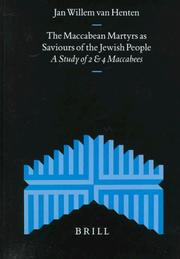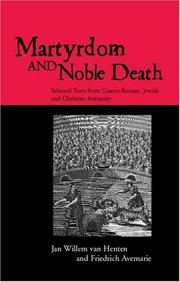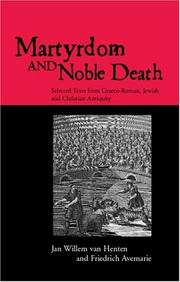| Listing 1 - 10 of 39 | << page >> |
Sort by
|

ISBN: 9004109765 9004497544 9789004109766 9789004497542 Year: 1997 Volume: 57 Publisher: Leiden: Brill,
Abstract | Keywords | Export | Availability | Bookmark
 Loading...
Loading...Choose an application
- Reference Manager
- EndNote
- RefWorks (Direct export to RefWorks)
This volume deals with the presentation of the so-called Maccabean martyrs and the elder Razis in 2 and 4 Maccabees, discussing the religious, the political as well as the philosophical aspects of noble death in these writings. It argues that the theme of martyrdom is a very important part of the self-image of the Jews as presented by the authors of both works. Eleazar, the anonymous mother with her seven sons and Razis should, therefore, be considered heroes of the Jewish people. The first part of the book discusses the sources and the second part deals with the descriptions of noble death. This section of the book also offers extensive discussions of related non-Jewish traditions which highlight the political-patriotic dimension of noble death as described in 2 and 4 Maccabees.
Martelaarschap (Jodendom) --- Martyrdom (Judaism) --- Martyre (Judaisme) --- 222.9 --- Makkabeeën --- Martyrdom --- Judaism. --- Bible. --- Fourth Book of Maccabees --- Criticism, interpretation, etc. --- Judaism --- 4 Maccabees (Apocryphal book) --- 4th Maccabees (Apocryphal book) --- Fourth Maccabees (Apocryphal book) --- IV Maccabees (Apocryphal book) --- Book of IV Maccabees --- Iōsēpos peri autokratoros logismou --- 2 Maccabees (Apocrypha) --- 2 Machabees (Apocrypha) --- 2nd Maccabees (Apocrypha) --- 2nd Machabees (Apocrypha) --- Maccabees, 2nd (Apocrypha) --- Machabees, 2nd (Apocrypha) --- Makabim 2 --- Second Maccabees (Apocrypha) --- Second Machabees (Apocrypha) --- Sefer ha-Makabim 2 --- Bible. O.T. Apocrypha. Maccabees 2nd --- Criticism, interpretation, etc --- De Machabais (Apocryphal book) --- De Maccabaeis (Apocryphal book) --- Flavii Iosephi De Maccabaeis --- Flavii Iosephi Peri autokratoros logismou --- Peri autokratoros logismou --- Flavii Iosephi De imperio rationis --- Jewish Philosophy
Book
ISBN: 9024262739 Year: 1994 Publisher: Kampen Kok
Abstract | Keywords | Export | Availability | Bookmark
 Loading...
Loading...Choose an application
- Reference Manager
- EndNote
- RefWorks (Direct export to RefWorks)
226.3 --- Evangelie volgens Marcus --- Bible NT. Gospels. Mark
Article
Abstract | Keywords | Export | Availability | Bookmark
 Loading...
Loading...Choose an application
- Reference Manager
- EndNote
- RefWorks (Direct export to RefWorks)
Article
Abstract | Keywords | Export | Availability | Bookmark
 Loading...
Loading...Choose an application
- Reference Manager
- EndNote
- RefWorks (Direct export to RefWorks)
Multi
ISSN: 1566208X ISBN: 9789004221048 9789004221055 9004221042 9786613470690 1283470691 9004221050 9789004260016 Year: 2012 Volume: 16 Publisher: Leiden: Brill,
Abstract | Keywords | Export | Availability | Bookmark
 Loading...
Loading...Choose an application
- Reference Manager
- EndNote
- RefWorks (Direct export to RefWorks)
Violence is present in the very heart of religion and its sacred traditions – also of Christianity and the Bible. The problem, however, is not only that violence is ingrained in the mere existence of religions with their sacred traditions. It is equally problematic to realise that the icy grip of violence on the sacred has gone unnoticed and unchallenged for a very long time. The present publication aims to contribute to the recent scholarly debate about the interconnections between violence and monotheistic religions by analysing the role of violence in the New Testament as well as by offering some hermeneutical perspectives on violence as it is articulated in the earliest Christian writings. Contributors include: Andries G. van Aarde, Paul Decock, Pieter G.R. de Villiers, Ernest van Eck, Jan Willem van Henten, Rob van Houwelingen, Kobus Kok, Tobias Nicklas, Jeremy Punt, Jan G. van der Watt, and Wim Weren.
Bible --- Violence in the Bible --- Violence --- Religious aspects --- Christianity --- Bible. --- Criticism, interpretation, etc. --- -225.08*3 --- Violent behavior --- Social psychology --- Theologie van het Nieuwe Testament: themata --- -Christianity --- -Bible. --- Ba-yon Tipan --- Bagong Tipan --- Jaji ma Hungi --- Kainē Diathēkē --- New Testament --- Nouveau Testament --- Novo Testamento --- Novum Testamentum --- Novyĭ Zavet --- Novyĭ Zavi︠e︡t Gospoda nashego Īisusa Khrista --- Novyĭ Zavit --- Nuevo Testamento --- Nuovo Testamento --- Nye Testamente --- Perjanjian Baru --- Dhamma sacʻ kyamʻʺ --- Injīl --- -Conferences - Meetings --- 225.08*3 Theologie van het Nieuwe Testament: themata --- 225.08*3 --- Conferences - Meetings --- Violence in the Bible - Congresses. --- Violence - Religious aspects - Christianity - Congresses. --- present-day spiritualities --- spirituality in religions --- modern Western Buddhism --- Christian spirituality --- Catholic popular devotion --- popular spirituality --- spirituality in organizations --- CAM --- healing --- spiritual humanism --- the cultivation of humanity --- spirituality and esotericism --- Corpus Mysticum --- contemporary Dutch literature --- spiritual engagement --- religious engagement --- religous and secular spiritualities --- religious studies --- the study of present-day spiritualities
Book
ISBN: 9789004237001 9789004242159 Year: 2013 Volume: 17 Publisher: Leiden [etc.] Brill
Abstract | Keywords | Export | Availability | Bookmark
 Loading...
Loading...Choose an application
- Reference Manager
- EndNote
- RefWorks (Direct export to RefWorks)
Christian ethics --- Judaism --- Ethics. --- Morale chrétienne --- Judaïsme --- Morale --- History --- Histoire --- Bible. --- Criticism, interpretation, etc. --- Greece --- Rome --- Grèce --- Religion. --- Religion --- Religion grecque --- Religion romaine --- 241 "00/04" --- Academic collection --- Moraaltheologie. Theologische ethiek--?"00/04" --- Morale chrétienne --- Judaïsme --- Grèce --- Religion grecque. --- Religion romaine.
Dissertation
ISBN: 9090014217 Year: 1987 Publisher: Leiden : s.n.,
Abstract | Keywords | Export | Availability | Bookmark
 Loading...
Loading...Choose an application
- Reference Manager
- EndNote
- RefWorks (Direct export to RefWorks)
222.9 --- Makkabeeën --- Theses

ISBN: 9780415138918 0415138914 9780415138901 0415138906 Year: 2002 Publisher: London: Routledge,
Abstract | Keywords | Export | Availability | Bookmark
 Loading...
Loading...Choose an application
- Reference Manager
- EndNote
- RefWorks (Direct export to RefWorks)
Martyrdom --- Death --- 235.3*7 --- 235.3*7 Martelaren --- Martelaren --- Religious aspects --- Suffering --- Martyrs --- Martyrdom - Comparative studies. --- Death - Religious aspects - Comparative studies. --- Death - Religious aspects - Comparative studies

ISBN: 1280335653 020399440X 9780203994405 0415138906 0415138914 9781280335655 9781134772230 9781134772278 9781134772285 9780415138901 9780415138918 1134772270 Year: 2002 Publisher: London New York Routledge
Abstract | Keywords | Export | Availability | Bookmark
 Loading...
Loading...Choose an application
- Reference Manager
- EndNote
- RefWorks (Direct export to RefWorks)
Martyrdom --- Death --- Suffering --- Martyrs --- Religious aspects
Book
ISBN: 9789462988187 9462988188 9789048540211 9048540216 Year: 2020 Publisher: Amsterdam : Amsterdam University Press,
Abstract | Keywords | Export | Availability | Bookmark
 Loading...
Loading...Choose an application
- Reference Manager
- EndNote
- RefWorks (Direct export to RefWorks)
The phenomenon of martyrdom is more than 2000 years old but, as contemporary events show, still very much alive. This book examines the canonisation, contestation and afterlives of martyrdom and connects these with cross-cultural acts and practices of remembrance. Martyrdom appeals to the imagination of many because it is a highly ambiguous spectacle with thrilling deadly consequences. Imagination is thus a vital catalyst for martyrdom, for martyrs become martyrs only because others remember and honour them as such. This memorialisation occurs through rituals and documents that incorporate and re-interpret traditions deriving from canonical texts. The canonisation of martyrdom generally occurs in one of two ways: First, through ritual commemoration by communities of inside readers, listeners, viewers and participants, who create and recycle texts, re-interpreting them until the martyrs ultimately receive a canonical status, or second, through commemoration as a means of contestation by competing communities who perceive these same people as traitors or terrorists. By adopting an interdisciplinary orientation and a cross-cultural approach, this book goes beyond both the insider admiration of martyrs and the partisan rejection of martyrdoms and concisely synthesises key interpretive questions and themes that broach the canonised, unstable and contested representations of martyrdom as well as their analytical connections, divergences and afterlives in the present.
Martyrdom --- Canonization --- 235.3*7 --- Rites and ceremonies --- Beatification --- Christian saints --- Death --- Suffering --- Martyrs --- 235.3*7 Martelaren --- Martelaren --- Religious aspects --- Canonization. --- Martyrdom. --- Martyrdom, canonization, commemoration. --- Martyre
| Listing 1 - 10 of 39 | << page >> |
Sort by
|

 Search
Search Feedback
Feedback About UniCat
About UniCat  Help
Help News
News